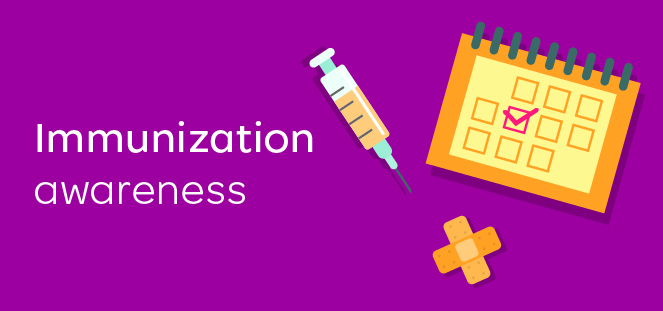Making vaccinations a lifelong practice

The highest county vaccination rate in Oregon is 55%. This means more than half of the population in the state’s highest immunized county remains vulnerable to preventable diseases. With Oregon striving to achieve higher rates for all recommended vaccines, including having 80% of 2-year-olds fully vaccinated by 2020, Moda Health’s Kali Paine said there’s still a lot of work to be done.
A health promotion and quality improvement specialist in Moda’s Population Health Department, Paine is part of a team that’s raising awareness about the importance of immunization, and how vaccines help people stay healthy.
“There’s a lot of information out there that can get muddled up,” she said. “We try to keep it simple by saying that vaccination is the safest and most effective way to prevent diseases. Plus, it’s many, many times cheaper than treating the disease. Immunization is really the best and cheapest way to keep yourself healthy.”
Her team’s year-round outreach efforts include emailing and mailing Moda Health members vaccination schedules based on their age. Member Health Advocates also do outreach to follow up on these vaccine recommendations. The Centers for Disease Control and Prevention (CDC) has developed an immunization schedule for children from birth to adolescents and young adults to the elderly. Following this schedule can help a person prevent diseases and related health conditions, as well as protect others within the community from serious illnesses.
“It’s definitely a year-long campaign that goes beyond child vaccinations,” said Paine. “Immunization schedules follow a child from birth to age 21. We reach out to members about well-child visits, screenings, immunizations that children should get by age 2, adolescent immunizations, and why immunizations are important in terms of herd immunity and prevention.”
Not just for kids
Paine said that it is important for people to understand that vaccinations don’t stop at adolescents. They include adult immunizations to protect people at all ages.
“It’s definitely not something that stops when your child turns twelve and they get their last HPV shot,” she said. “We outreach to parents about child wellness, seniors, and non-senior adults about the flu vaccine and adult immunizations like pneumococcal. With recommendations for so many ages, we want to make sure everyone is getting their vaccines on schedule. That’s when they are most effective. The schedule exists for a reason.”
While many efforts focus on childhood vaccines, Paine said there’s a good reason for this. Getting parents on board early is important for creating a lifelong practice for vaccination.
“One of the reasons there’s so much focus on childhood vaccinations is if you can get someone to start vaccinating early, they’ll continue that behavior their whole life,” she said. “So many parents make the decision to vaccinate, or not, even before their child is born. We want to get in there early and provide them that information in hopes that they will start and continue that behavior.”
Fear of not knowing
One of the challenges Paine sees is the amount of information that is available on the internet and social media. While access to more information is good, how people get their information can influence their decision on whether or not to vaccinate.
“When we talk with parents, we understand that it can oftentimes be more of an emotional decision than a rational logical decision,” she said. “A friend’s child who had an adverse reaction can hold a lot more weight than a bunch of scientific data. Educating people about why vaccines are effective sometimes doesn’t go as far as just being empathetic to their concerns. If we are able to connect with someone, that’s when the education piece can help because a lot of the fear comes from just not knowing.”
Public threat
Preventable disease can sometimes turn into chronic conditions that can impact not only your life, but your community, as well. For example, the measles outbreak earlier this year in Clark County, Washington, saw more than 70 cases, and even temporarily shut down businesses.
“Vaccination can definitely affect much more than a person’s health,” said Paine. “In Clark County, some businesses had to close their doors because an exposed child had been there. People who have family members who are immunocompromised are less willing to go out in public because they fear getting infected. There’s also lower attendance for kids who are sick and kids who don’t attend because their parents don’t want them to get vaccinated.”
Paine shared several things that everyone should consider when thinking about vaccinations. They include:
- Vaccines are safe and effective. The CDC, American Academy of Pediatrics (AAP), and Advisory Committee on Immunization Practices (ACIP) vaccine recommendations are safe and effective, especially when received on schedule.
- Best form of preventive care. Vaccinations are one of the easiest and cheapest forms of preventive care. Getting recommended vaccines on schedule costs a fraction of what it would cost to treat a vaccine-preventable illness.
- Positive community impact. Vaccinations can also have a positive economic impact. Illness outbreaks close local businesses, cost money to contain and treat, and cause sick people to miss school and work.
- Education is just one form of awareness. Educating people on vaccine safety and effectiveness is important, but not always the best approach. Many people react to vaccines emotionally rather than logically, so empathy and patience are also important when talking to vaccine-hesitant people.
- Freedom of choice should include public safety. Many people talk about the decision to vaccinate as an issue of personal rights or freedoms. While everyone has the right to decide against vaccinating themselves or their children, the rest of the world also has the right to feel safe and healthy in public spaces.
Paine recently attended the Northwest Immunization Conference, which focused on strategies for improving immunization practices. She said it was helpful to listen to providers talk about why people decide not to vaccinate.
“It’s very helpful to learn why people are hesitant to get vaccinated,” she said. “We can tailor our work around that to help improve Oregon’s current vaccination rates, which show that there’s still a lot of work to be done.”
Moda Health Months: Our personal health stories Read more personal health stories on our Moda Health Community page.

Hello.
We have exciting news to share. ODS is changing its name to Moda Health.
Moda comes from the latin term "modus" and means "a way". We picked it because that's what we are here to do: help our communities find a way to better health.
Together, we can be more, be better.
Please select the state you live in, or the state where your employer is headquartered, so we can tailor your experience:

Hello.
Please select the state you live in, or the state where your employer is headquartered, so we can tailor your experience:
Changing your location to Oregon
You can return to your previous location in the site header.
